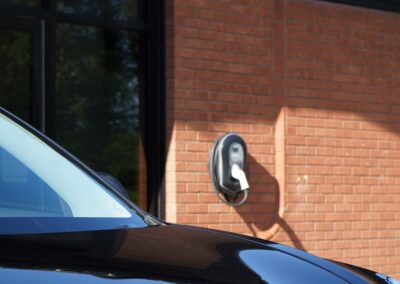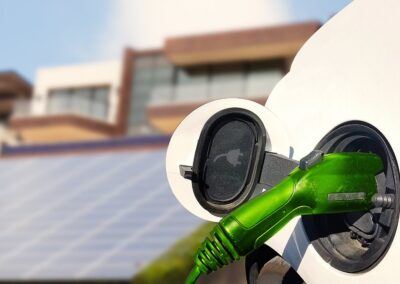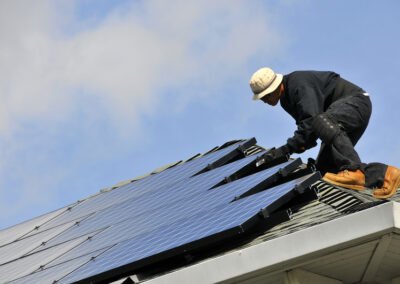Solar Vehicle Charger, Toronto
For homeowners looking for sustainable ways to fuel their vehicles and reduce their overall carbon footprint, having a solar vehicle charger installed not only reduces your environmental impact, but makes economic sense.
Request InformationSchedule Service
Solar Vehicle Charger, Toronto
Having an electric vehicle installed likely means that your hydro bills will show a significant increase in cost, which is why many homeowners are turning to solar power for their source of household electricity. Not only it is a great investment to reduce electrical costs, but having a solar vehicle charger installed is a great way to further reduce your overall environmental impact. In fact, governments worldwide are opting for greener alternatives and are looking to start phasing out gasoline vehicles to encourage consumers to go electric. It’s estimated that in the next 10 years, a large percentage of household vehicles will be partially to fully electric.
With vehicle manufacturing companies like Nissan, Hyundai, Ford, Chevrolet, and many more continually releasing newer hybrid/fully electric models, the demand for sustainable sources of fuel and renewable energy has increased a significant amount over the years. Efficiently powering these everyday vehicles means a consistent and affordable source of energy is needed. This is where solar power comes in. For those concerned about their environmental impact and the ethics of responsible transportation, this also the perfect solution.
Electricity that is generated by solar power through a solar energy system can be used to power both your home and your electric vehicle through a solar vehicle charger, resulting in convenient, efficient, and guilt-free consumption. The feasibility of powering a vehicle with sunlight has become a practical reality as the cost of solar power continues to fall rapidly, with as little as 10 solar panels in a panel array providing enough energy to charge a vehicle’s battery.
Powering a vehicle with a solar vehicle charger requires a charging station and solar panels installed on a home’s surface. The exact amount of power that an electric vehicle requires can depend on the type of vehicle you have, how much you drive, and the battery system incorporated into the solar panel system. Generally, the more you drive and the longer the distance that is required for a daily commute, the more energy (and therefore more solar panels) you will need. For example, those living in denser urban areas will typically require less power.
Battery storage in a solar panel system can also affect the functionality of a solar vehicle charger. Along with generating power, solar panels need to be able to store energy, which is crucial with most homeowners charging their vehicles overnight rather than during the day when the sun is out. Work with a licensed electrician to ensure that your solar panel system has a good storage capacity, enough to meet daily mileage requirements.
Contact MADE ELECTRIC for more information on solar vehicle chargers! We operate within the GTA and Toronto, and would be happy to help you through the process of transitioning to solar power. Whether you’re looking to have solar panels installed for your home, need help in picking out the perfect solar vehicle charger, or have questions about connecting your solar panels to your current charging station, we are here to answer your call.
Frequently Asked Questions (FAQs)
How long will my solar vehicle charger last for?
Solar panels typically last for 25-30 years, or three decades. The lifespan of the charging station itself can depend on the model and the frequency of use. For a complete equipment and cost assessment, contact MADE ELECTRIC today!
What is the cost of a solar vehicle charger and how much can I expect to save in the long run by having one installed?
This depends on several factors, but the potential savings over the long run is significant enough that many homeowners are making the switch to solar power. Electric vehicle chargers can vary in price to several hundred to several thousand for more high-end models with more features and capabilities. For the solar panels themselves, this is typically around $3 per watt, or approximately $3,000 for a 1 kW system. Including installation, costs can enter the $10,000 range for a solar power system that will able to sustainably charge your vehicle for several decades.
The investment pays for itself, as you can expect to save thousands of dollars as your annual utility costs of gas and electric is reduced a few hundred. The savings will also be significantly more if you are looking to incorporate an EV system into your already-existing solar array.
What are some tips for optimal solar vehicle charger use and installation?
If you have the benefit of foresight, when planning out your solar energy system, it’s often recommended to map out your system based on any future additional electricity use. Adding an electric vehicle charging system can create a greater demand for power, so it’s important to ensure that there will be enough room. It’s also possible, however, to make room in an already-existing solar panel system by doing things such as switching out your light bulbs for more energy-efficient ones, upgrading your appliances to modern ones that demand less power, etc. This can free up some of the space to allow for other uses.




